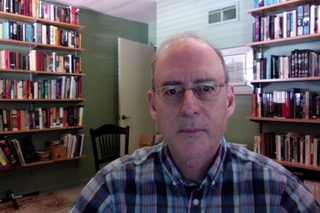On a still, humid night in July 1858, two eminent surgeons from Tallahassee, Dr. Manvers and Dr. Treadwell, were summoned to the Verdura Plantation, whose owners, the Buxtorf family, were among the wealthiest cotton planters in Leon County. They were met at the door by a liveried servant, who ushered them into the library of Darius Buxtorf, the patriarch of the clan. A tall, imposing man in his early fifties, Mr. Buxtorf welcomed his guests with what both perceived to be a forced heartiness, then asked them to sit and poured sherries for the three of them. It was apparent that the planter had been drinking for some time and was in a state of what Dr. Manvers would later describe as “despondent hilarity,” but he soon lapsed into the apathetic posture of deep depression. When Dr. Treadwell asked how they could be of assistance, Buxtorf informed them that his son, Edward, was “a lifelong hostage to the cruelest possible misfortune.”
Dr. Manvers glanced at his colleague. “And what is the nature of your son’s misfortune?” he asked.
“My son was born with a… defect,” Buxtorf replied. “Which has forced upon him a life of extreme isolation. He sees no one, not even his own family, the single exception being an elderly house servant, named Lettie, who he has known from infancy. He communicates through notes and letters conveyed by her, his only friend.”
Dr. Treadwell, who had not lived long in Tallahassee, but had already heard vague rumors about ‘the Buxtorf family secret,’ took a polite sip of his sherry, a drink he didn’t enjoy, then decisively placed the glass on the table beside his chair.
“Could you describe this defect, sir?” he asked.
After a silence that began to grow uncomfortable, during which Buxtorf drained his glass, he said, staring at the floor with an expression of mingled shame and distaste, “It is what is known to medical science as a supernumerary teratoid. Parasitic type.”
The doctors exchanged a meaningful look. Dr. Treadwell leaned forward in his chair. “May we assume, then, sir, that you are inquiring as to the possibility of surgical intervention?”
Buxtorf nodded. “It is my son’s wish, conveyed to me by letter. He informs me that he can no longer endure his present condition. To quote from his letter: ‘If the surgery kills me, so much the better.'”
“And how old is your son, sir?”
“Twenty-three last month. I confess, gentlemen, that my store of hope has been attenuated by several discouraging consultations with other doctors. But having read of the recent advances in the surgical arts, it occurred to me that you gentlemen, both leaders in your profession, might be able to deliver Edward from what has been, I assure you, unimaginable torment.”
“Is he otherwise healthy?” Manvers asked. “What I mean is, would he be able to endure what could, of necessity, be a radical and dangerous procedure?”
Buxtorf closed his eyes and nodded. “Aside from his affliction, he is healthy, strong, highly intelligent, learned, and musical. His mother has been inconsolable since the day of his birth. This thing has blasted our lives. The midwife who delivered him had the temerity to suggest that he either be smothered—a task she volunteered to perform immediately—or else be ‘allowed to die,’ but we couldn’t, we simply couldn’t do that. I sent the woman away. He is my only son and heir, you see.”
“Mr. Buxtorf,” Dr. Treadwell said. “You have our deepest sympathy, and we will do what we can. But you should know that neither of us has ever seen, much less surgically treated, an example of what you describe, which comes in many forms and is extremely rare. Life, on occasion, makes dreadful mistakes in the gestation process, and what was meant to be twins becomes, as you know better than I do, something very different. Most births of this type are stillborn, but some few survive, and the fact that your son has reached adulthood in his condition is, quite frankly, astonishing. It gives us a degree of hope that surgery might be feasible. But the possibility of even attempting an excision in a case like this will depend entirely on the nature and position of the parasite twin, and the mutual involvement of the organs and blood vessels. Surgical intervention could be medically impossible. That is to say, fatal to the patient.”
Manvers added: “We will certainly try our utmost, sir, but your son must agree to let us examine him. Otherwise, we can do nothing.”
“He will allow it,” Buxtorf said. “However, I must advise you, gentlemen, to prepare yourselves.” He pulled a silken bell cord next to his wing chair, and a bent, elderly and mournful-looking Black woman hobbled into the room. “Lettie, please escort these gentlemen to Edward’s room and inform him that they have agreed to do what they can.”
Dr. Manvers noted that the old woman’s face brightened at this news, then she nodded and gestured for them to follow her, and with slow and labored tread led them up a magnificent, Persian-carpeted staircase to the second floor landing. They were led down a long hallway to a door at the end, where she lightly knocked and waited until a low murmur bade her enter. She signaled the doctors to wait, then opened the door just wide enough to slip inside and closed it behind her. All was silent within, then the door opened and Lettie reappeared, gesturing for the men to enter. They found themselves in a small foyer that opened into a larger room. The old woman pointed the way, then nodded and left the men alone. The room felt strangely cold, considering the heat of the evening, and though neither man cared to admit it, both were experiencing an odd reluctance to pass from the foyer into the main room.
They waited a moment, then Dr. Treadwell said, “Mr. Buxtorf? May we enter?”
“Come in, gentlemen,” a deep, quiet, cultivated voice answered. “But please maintain a distance until I signal you to approach me.”
Looking apprehensively at each other, the two men rounded the obscuring wall and entered a large and stately sitting room, rather dimly lit by three gas jets affixed to the walls and an oil lamp on a desk. There was a short hallway leading, one assumed, to a bedroom. One side of the sitting room was devoted to an entire wall of bookshelves, and on the large desk lay open many volumes. A baby grand piano reposed in another corner, and there were leather chairs and a couch in the center of the room. On the wall directly opposite where the doctors stood was a full-length mirror, obscured by a partially drawn green velvet curtain, and which happened to be directly under a gas jet.
Standing to the right of this mirror stood a young, elegantly dressed man who, at first glance, seemed remarkably well-favored. He was tall and broad-shouldered, if somewhat stooped, and as might be expected of a person who rarely if ever left his room, of a pale, almost sickly complexion. His face, framed by longish, wavy brown hair, was clean-shaven, with a strong jaw, a prominent nose and large hazel eyes set wide apart. An expression of unrelieved misery in his eyes, however, marred the otherwise handsome features. He slightly inclined his head to the doctors but did not smile. The deep lines in his forehead and around his eyes, and the downward turn of his mouth, spoke of long suffering, even as he murmured, “Welcome, gentlemen,” in a scarcely audible baritone. He stood rigidly facing them and raised an admonishing hand when Dr. Manvers took an unthinking step forward.
“If you’ll remain where you are, sir, I’d be most grateful.”
He had spoken twice in a controlled tone, but the doctors had uneasily noted that both times there was a low, hissing sibilance behind his words, like air escaping from a loose valve. It was unsettling, more so because both men were discreetly scanning the young man’s person for any protrusion or lumpiness, especially in the torso, the presence of which might have betrayed a deformity concealed as best as a tailor’s skill could manage, but they could see nothing out of the ordinary. Except for his forlorn expression, Edward Buxtorf appeared to be a normal young representative of the Southern aristocracy. Dr. Treadwell even began to wonder if the trouble here—which may have involved the entire family—was psychological, not physical.
“Mr. Buxtorf, I am Dr. Elias Treadwell, and this is Dr. Benjamin Manvers. Your father has requested a consultation on a possible surgical excision that could be at the very least traumatic, and possibly fatal. Do you understand and accept the risk of such a procedure?”
“I understand and welcome it,” was the reply, and again the doctors were startled by an abrupt expulsion of air, rising in volume to a breathless rush of rhythmic gasping that Treadwell realized with a chill up his spine was laughter, but laughter of a pitch and kind he had never in his life heard from a human throat. Dr. Manvers, baffled by the sound that clearly wasn’t coming from Mr. Buxtorf, felt the hairs rising on the back of his neck. Buxtorf, meanwhile, had tightly shut his eyes and clapped his hands over his ears. The wheezing laughter was joyless, derisive, and wholly malign, and when it finally ended, the young man stared in helpless torment at the doctors.
“The issue has been forced, gentlemen,” he said with the grimmest of smiles. “If you’ll direct your attention to the mirror, you will see something that few men have.”
He stepped sideways in front of the mirror, and reaching behind him, took hold of the curtain rod and opened the green curtains wide. The mirror, they saw, was slightly tilted at an angle that allowed them a full, if rather poorly illuminated, view of the back of the young man’s head. Now, at last, they could see Edward Buxtorf’s twin which, besides a hunchback-like protrusion of the unfortunate man’s upper back and shoulders and an unnaturally thick nape of neck, consisted solely of a face growing from the back of his head. It was obvious even from the fifteen or so feet separating them from Mr. Buxtorf that the face was not, as the doctors half-expected, that of a dribbling imbecile, but of a conscious and fully aware being. Indeed, it was meeting their horrified gazes with an expression of savage amusement on its truncated features. The face appeared to be completely hairless, devoid even of eyebrows, the strangely flat countenance nestled within the scalp and surrounding hair of Edward Buxtorf like someone peering through an opening in thick brush.
Mr. Buxtorf’s head, which had seemed so pleasing from the front, was grotesquely elongated when seen from the back, and must have weighed heavily on the poor man’s neck and shoulders. The face was predictably male, as all identical twins must be of the same sex, even when one of the twins was half-assimilated, but it resembled Edward Buxtorf more as a rough, unflattering sketch than the uncanny likeness of a normal twin. Its nose was small, broad, and almost flat against the face, the lips so thin that the mouth, a cruel parody of Edward’s fine features, was more of a slash, its teeth few and rotten, and the ears tiny, twisted things resembling shriveled mushrooms. A tongue, short and darting, was continually revealed as the thing opened and closed its mouth, blowing, hooting and grimacing at the doctors, though how it could make any vocalizations at all with what must have been at best vestigial lungs was a mystery.
But it was the eyes that dominated the scarcely human face. They were of the same hazel color as Edward’s, large in proportion to the minimal nose, mouth and ears, and set very close together. As they glared into the mirror straight into his own eyes reflected there, Dr. Treadwell struggled with feelings chiefly of fear and revulsion but also a hopeless pity, both for Edward Buxtorf and the vile thing marooned in his body, flinging its fathomless rage, bitterness and nihilistic hatred at every being it saw that nature had endowed with a normal physique.
“Merciful God!” was forced involuntarily out of Manvers, louder than he perhaps intended, jarring Treadwell out of his reverie.
“No, Dr. Manvers,” Edward Buxtorf said, shaking his head vehemently. “If there is a God, he has no mercy, and if there isn’t, we are simply the easily broken toys of Nature, subject either to her sadistic whims, or her blind indifference. In my experience, it amounts to the same thing.”
Watching the furious face of the teratoid moving helplessly in time to Buxtorf’s negative response to Dr. Manvers’ shocked epithet, Treadwell shuddered.
“Your expressions tell me a great deal, gentlemen,” Buxtorf said. “And I can perhaps anticipate your response to my question: can you free me from this nightmare?”
“I begin to glimpse, if dimly, the dimensions of your problem, Mr. Buxtorf,” he said, badly shaken. “And I wholly sympathize with your desire to be rid of this, well, what modern medicine has chosen to call a monster, but might better be understood as a rare and tragic error of early pregnancy that came to term. If you will allow us to more closely examine you, we will be better able to decide if surgery is viable in your case.”
“Of course. It’s why I asked you here,” Edward said, and motioned the men forward. “But please keep your fingers a safe distance from its mouth. It bites.” As they uneasily approached the sufferer, medical bags in hand, the teratoid made a loud hissing sound, not unlike a snake threatening an attacker, that quickly rose to a hoarse and jagged screech.
…
From Dr. Treadwell’s consultation notes on Edward Buxtorf:
“The patient is a twenty-three year-old Caucasian male with a supernumerary twin of the parasitic variety, attached and more or less assimilated into his upper back, neck and the posterior portion of the head. No limbs are visible or palpable as protrusions and may have long since been absorbed into the dominant twin’s body. The twin has never been named by the patient or his family, though it sleeps and wakes at varying times of the day and exhibits a surprising level of intelligence for this type of teratoid. It rages day and night against its lot in life and displays a bitter hatred toward its twin brother. It seldom speaks in audible or recognizable words, but gibbers and sneers unceasingly, more often in a rapid, phlegmy whisper than a full-throated voice, and seems to revel in mocking its brother’s emotions, especially when the patient is weeping over his ghastly fate.
“The relationship between these strange siblings is one of a victim to its tormentor, or if I may be allowed the fancy, between a demon and a damned soul. The patient has confessed to me that he keeps two mirrors that face each other in his bedroom, and sometimes stands between them, forcing himself to endure the hateful gaze of what he calls his “devil twin,” and the continuous outpouring of inarticulate abuse for as long as he is able. When I asked him why, he replied that although he fears and hates his brother, ‘I am knit to this fiend, and he to me, from birth to death, closer than lovers, and our fate and our curse is mutual. I could smother him at any time merely by lying face up on a pillow. But I can’t. I feel in some unaccountable way both responsible for him and overwhelmed with guilt, as if I were the victor in some ferocious and primitive contest for dominance in the womb, and the result is what you see. For if I know one thing in this life, it is that my twin’s misery is infinitely greater than my own.’
“The patient became distraught during our consultation and said things that may have been the delusions of a man in the grip of an almost hysterical despair. He said, to cite an example, that the thing is always awake when he tries to sleep, and constantly whispers to him ‘of such things as they only speak of in Hell. No imagination can conceive the dreadful temptations it sets before me.’ He begged me, since he himself is incapable of it, to crush it out of human semblance, to silence it forever, ‘even if I die for it.’
“It was with the greatest reluctance and regret that I informed the patient, and later his father, that surgery was simply out of the question in this case. There is an inextricable sharing of vital organs and blood vessels, a devilish miracle of natural ingenuity in the way his body, while still in the womb, adapted to two beings fused in one flesh. Dr. Manvers and I fully agree that any attempt to remove, destroy, or even to render the twin permanently comatose would result in Mr. Buxtorf’s death. Our Hippocratic Oath clearly forbids any action that the physician is aware will result in the death of the patient. Our hands are tied in this instance, and as long I live, I will never forget Edward Buxtorf’s devastated expression when we informed him of our decision. It was as if we had snatched up the rope that would have borne him safely out of Hell, turned our backs and left him to his fate.”
…
“Postscript to the consultation notes of Dr. Manvers (he did not give permission to cite the text of his notes here):
“Three months to the day after our visit to that unlucky house, Edward Buxtorf managed to obtain and ingest a fatal dose of strychnine. Dr. Treadwell and I were apparently his last hope of deliverance from his lifelong curse. It is perhaps the greatest regret of my life that we were powerless to help him in the way he wanted us to, which I fully believe was not surgical separation from his twin that he, as an educated man, probably knew was medically impossible, but suicide by scalpel. It is believed that Lettie, the aged nanny, provided the poison. No action has been taken against her, and in truth, neither Dr. Treadwell, myself, nor, I believe any member of his family considered it anything other than an act of loving kindness and mercy.”
About the Author
 Jeffrey Greene was born in Michigan, raised in Florida, and currently lives in Bethesda, Maryland. He has been writing and publishing short stories and the occasional novella since the 1980s. Some of the publications in which his stories have appeared are the North American Review, Tomorrow Speculative Fiction, Oasis, Reactor Magazine, Potomac Review, decomP Magazine, Zahir Speculative Fiction, and most recently, Bewildering Stories.
Jeffrey Greene was born in Michigan, raised in Florida, and currently lives in Bethesda, Maryland. He has been writing and publishing short stories and the occasional novella since the 1980s. Some of the publications in which his stories have appeared are the North American Review, Tomorrow Speculative Fiction, Oasis, Reactor Magazine, Potomac Review, decomP Magazine, Zahir Speculative Fiction, and most recently, Bewildering Stories.
His short story, “The Blind Gambler,” was included in the anthology,“100% Pure Florida Fiction,” in 2000, published by the University of Florida. He has self-published two collections of short stories: Stories From the Cold Room, and The Iron Desert and Other Stories.
![]()





